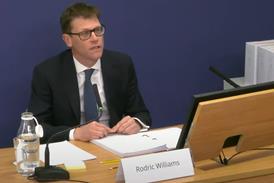
Let’s not get too excited about yesterday’s justice committee report on personal injury reforms.
In November the same committee basically told the Ministry of Justice to gather more evidence before going ahead with changing the discount rate. By March the MoJ had drawn up legislation to do it anyway. The committee might as well have whistled in the wind.
Yesterday’s damning summary of whiplash reforms may be headed straight to the MoJ trash folder, as the Civil Liability Bill carries on regardless.
But you can get a hint of the report’s significance from insurers’ reactions. LV= claims director Martin Milliner said claimant lawyers will be ‘riding the whiplash gravy train still partying like it’s 1999’. James Dalton, director of general policy at the Association of British Insurers, said the committee’s report ‘reads like a shopping list of asks from claimant lawyers’.
The narrative is clear: government reforms are designed to hurt only the greedy claimant lawyers - and MPs on the committee are doing their bidding.
I believe this is disingenuous. The report makes little reference to lawyers’ welfare and instead asks the simple question: will claimants left without representation be guaranteed the same access to justice? Once claimant solicitors are taken out of the equation, will the electronic platform (irrespective of how much they receive) ensure equality of arms with lawyered-up insurers?
The answer from MPs is a resounding no.
The committee implores the MoJ to take a more realistic approach to the technical challenges that everyone (even insurers) acknowledge are such a huge challenge. At the very least the reforms should wait until April 2020 to let the tech people get this right.
As it stands, the obstacles faced by self-represented claimants in the current process create an ‘unacceptable barrier’ to access to justice.
Counter-intuitively, the Civil Liability Bill is a sideshow to the real argument here. Proposed tariffs are too low for claimant lawyers, but they can live with the principle.
The justice committee has realised, quite pertinently, that the small claims limit is the big prize, even if reform requires only secondary legislation.
This report undoubtedly makes it less likely that the limit will increase to £5,000. But I wouldn’t bet on it prompting a government U-turn.

















![David Lester (senior partner at Blythe Liggins), Darryl Barnes, Jagdeep Sandher (head of dispute resolution at Blythe Liggins)[4]](https://d1d8vslyhr7rdg.cloudfront.net/Pictures/274x183/4/2/8/116428_davidlesterseniorpartneratblytheligginsdarrylbarnesjagdeepsandherheadofdisputeresolutionatblytheliggins4_981603_crop.jpg)






2 Readers' comments